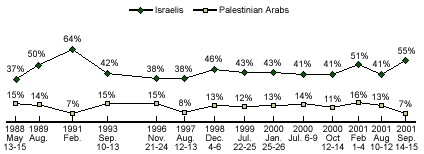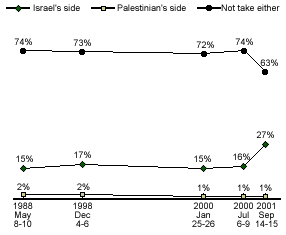GALLUP NEWS SERVICE
PRINCETON, NJ -- Palestinian authority leader Yasser Arafat announced yesterday that he would enforce a cease-fire and Israel agreed to suspend military actions, bringing a temporary halt to the fighting in the Middle East. Some believe the break in hostilities is a response to the terrorist attacks on the World Trade Center and the Pentagon last Tuesday. Prior to Arafat's announcement, but since the terrorist attacks, the latest CNN/USA Today/Gallup poll showed increased levels of support among Americans for Israel in its conflict with the Palestinians Arabs. A majority of Americans (55%) in the September 14-15 poll say their sympathies in the Middle East situation lie more with the Israelis than with the Palestinian Arabs, while 7% take the opposite view. Typically, about four in 10 Americans expressed greater sympathy for Israel than for the Palestinians, although 51% sided with Israel in a February 2001 poll. Support for the Palestinian Arabs has generally been about twice what it is now.
| In the Middle East situation, are your
sympathies more with the Israelis or more with the Palestinian Arabs? |
 |
The greater sympathy toward Israel is apparent in almost every key subgroup of the American public, showing double-digit increases when compared to August's reading on this measure. One exception is political liberals, of whom 39% are now sympathetic to Israel, up only slightly from 35% in August. The current overall rating of 55% is the highest level of sympathy for Israel since February 1991, during the Persian Gulf War.
A majority of Americans continue to favor the United States remaining officially neutral in the Middle East conflict, although there has been an increase, when compared to previous polls, in the percentage who advocate that the United States favor Israel. The latest poll shows 63% saying the United States should not take either side in the conflict, down from 74% in July of last year. Twenty-seven percent say the United States should take Israel's side in the conflict, 10 points more than the previous high of 17% registered in December 1998. Just 1% want the United States to take the Palestinian's side, consistent with earlier results.
| In the Middle East conflict, do you think the United States should take Israel's side, take the Palestinian's side, or not take either side? |
 |
Most Americans Do Not Favor Changes in Military, Economic Aid to Israel
The United States' strong support for Israel over the years is thought to be one of the contributing factors to the anger with America expressed by some citizens of Arab nations. A Gallup poll conducted in 1999 showed that few Americans wanted economic and military aid to Israel increased, with most favoring either keeping aid levels the same or decreasing them. An update on those attitudes this past weekend showed somewhat of an increase in the number of Americans who want aid to Israel kept the same, while fewer Americans favor decreasing aid. There has been no change in the percentage who want aid increased, however. Specifically, the latest poll shows only about one in three Americans want the United States to decrease economic aid to Israel (14%) or to stop providing Israel with economic aid altogether (16%). A majority of Americans, 55%, believe that United States' economic aid to Israel should be kept the same, and 8% think it should be increased. The combined 30% who want aid decreased or eliminated is much lower than the 42% figure obtained in July 1999. At that time, 8% wanted increased aid, but 45% thought that aid levels should be kept the same.
Thinking about the financial aid the United States provides Israel for economic purposes, do you think U.S. economic aid to Israel should be -- [ROTATED: increased, kept the same, or decreased]?
|
|
Kept |
|
ELIMINATED (vol.) |
No |
|
|
2001 Sep 14-15 |
8% |
55 |
29 |
1 |
7 |
|
1999 Jul 22-25 |
8% |
45 |
41 |
1 |
5 |
Do you think the United States should -- [ROTATED: reduce the amount of economic aid provided to Israel, (or) stop providing economic aid to Israel altogether]?
COMBINED RESPONSES
|
|
Kept |
|
Eliminated |
No |
|
|
2001 Sep 14-15 |
8% |
55 |
14 |
16 |
7 |
The results are similar when Americans are asked about military aid rather than economic aid. Thirty-one percent say the United States should decrease (11%) or stop providing (20%) military aid to Israel. A near majority of Americans, 47%, say United States' military aid to Israel should be kept the same and 16% want it increased. Again, fewer Americans today want military aid decreased or eliminated than did so in July 1999, when 44% preferred this.
Thinking about the financial aid the United States provides Israel for military purposes, do you think U.S. military aid to Israel should be -- [ROTATED: increased, kept the same, or decreased]?
|
|
Kept |
|
ELIMINATED (vol.) |
No |
|
|
|
|||||
|
2001 Sep 14-15 |
16% |
47 |
30 |
1 |
6 |
|
1999 Jul 22-25 |
10% |
42 |
44 |
* |
4 |
Do you think the United States should -- [ROTATED: reduce the amount of military aid provided to Israel, (or) stop providing military aid to Israel altogether]?
COMBINED RESPONSES
|
|
Kept |
|
Eliminated |
No |
|
|
2001 Sep 14-15 |
16% |
47 |
11 |
20 |
6 |
Survey Methods
These results are based on telephone interviews with a randomly selected national sample of 1,032 adults, 18 years and older, conducted September 14-15, 2001. For results based on this sample, one can say with 95 percent confidence that the maximum error attributable to sampling and other random effects is plus or minus 3 percentage points. In addition to sampling error, question wording and practical difficulties in conducting surveys can introduce error or bias into the findings of public opinion polls.
In the Middle East situation, are your sympathies more with the Israelis or more with the Palestinian Arabs?
|
|
Palestinian Arabs |
|
NEITHER |
No |
||
|
% |
% |
% |
% |
% |
||
|
2001 Sep 14-15 |
55 |
7 |
4 |
20 |
14 |
|
|
2001 Aug 10-12 |
41 |
13 |
7 |
18 |
21 |
|
|
2001 Feb 1-4 |
51 |
16 |
7 |
14 |
12 |
|
|
2000 Oct 13-14 ^ |
41 |
11 |
9 |
18 |
21 |
|
|
2000 Jul 6-9 |
41 |
14 |
5 |
18 |
22 |
|
|
2000 Jan 25-26 |
43 |
13 |
5 |
21 |
18 |
|
|
1999 Jul 22-25 |
43 |
12 |
11 |
19 |
15 |
|
|
1998 Dec 4-6 |
46 |
13 |
5 |
22 |
14 |
|
|
1997 Aug 12-13 |
38 |
8 |
5 |
19 |
30 |
|
|
1996 Nov 21-24 |
38 |
15 |
6 |
14 |
27 |
|
|
1993 Sep 10-12 |
42 |
15 |
6 |
17 |
20 |
|
|
1991 Feb |
64 |
7 |
19 |
-- |
10 |
|
|
1989 Aug |
50 |
14 |
15 |
-- |
21 |
|
|
1988 May 13-15 |
37 |
15 |
22 |
-- |
27 |
|
|
^ |
Based on interviews with 821 national adults; +/- 4 pct. pts. |
|||||
In the Middle East conflict, do you think the United States should take Israel's side, take the Palestinian's side, or not take either side?
|
Israel's |
Palestinian's |
Not take |
No |
||
|
% |
% |
% |
% |
||
|
2001 Sep 14-15 |
27 |
1 |
63 |
9 |
|
|
2000 Jul 6-9 ^ |
16 |
1 |
74 |
9 |
|
|
2000 Jan 25-26 |
15 |
1 |
72 |
12 |
|
|
1998 Dec 4-6 |
17 |
2 |
73 |
7 |
|
|
1998 May 8-10 |
15 |
2 |
74 |
9 |
|
|
^ |
Asked of a half sample. |
||||
* -- Less than 0.5%
vol -- volunteered response
